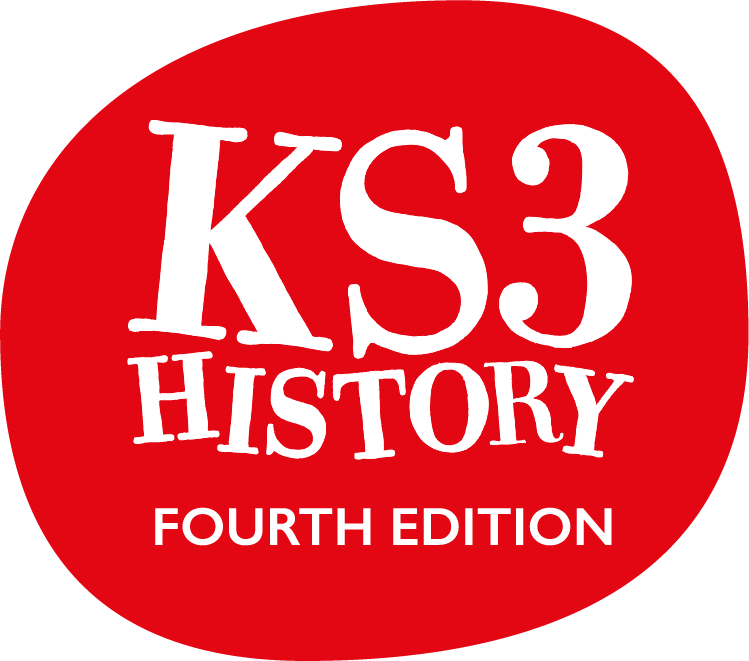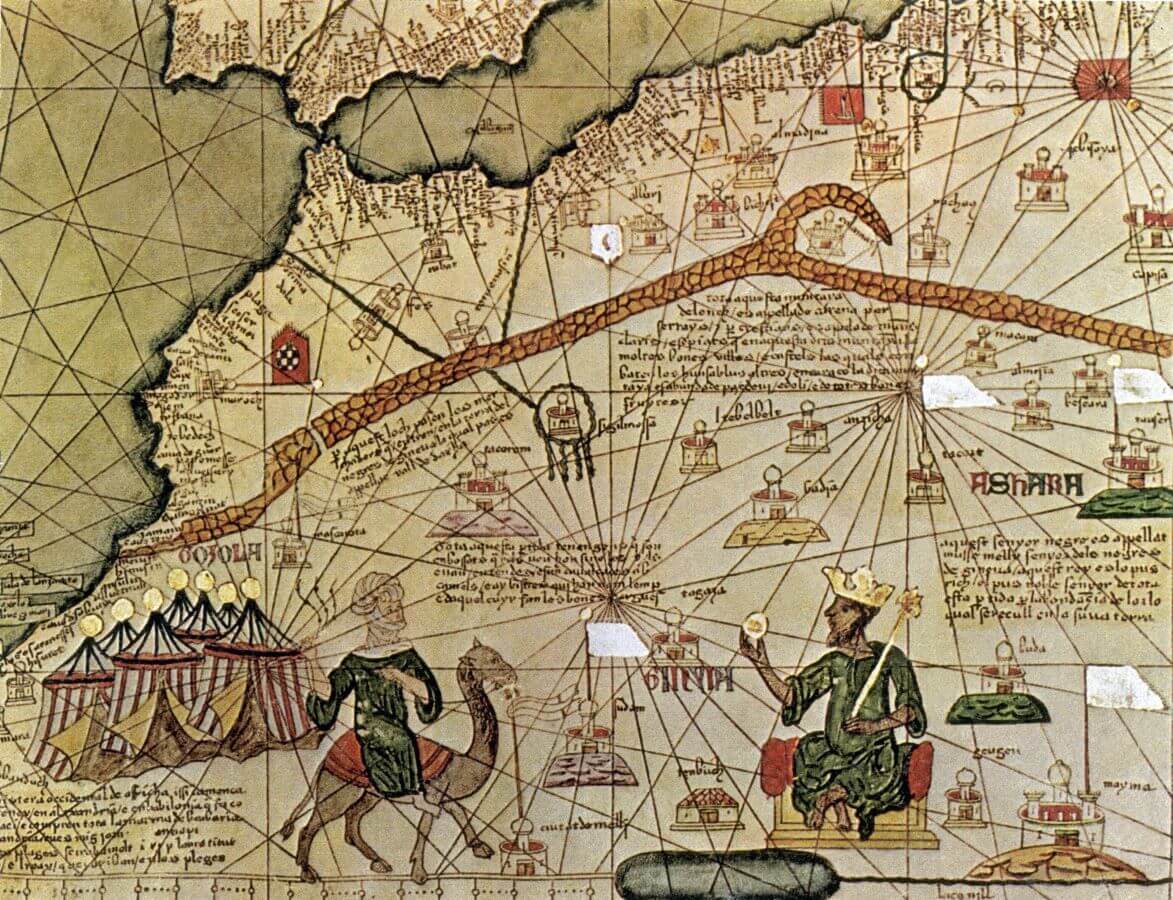A section of the Catalan Atlas drawn by the Spanish cartographer Abraham Cresques in 1375.
Katie Amery (KA) and Teni Gogo (TG) talk to Aaron Wilkes (AW) about why they chose to introduce the West African Kingdoms of Mali, Songhay, Benin and Asante into their curriculums and give practical suggestions for teachers also considering teaching these.
AW: There has been huge interest in the new Depth Studies that Oxford University Press are publishing this year, why do you think that is?
KA: There’s a real drive and a real passion from History teachers to deliver on diversity. Most of us had a massive wake-up call in 2020 which made a lot of teachers think about the curricular provision that we provide for our own students. We want to hear a range of different voices and it all ties in with this: the idea of decolonising the curriculum and looking at things through a range of different lenses. In terms of African Kingdoms, our aim is to deconstruct this Western myth that African History didn’t exist before the Europeans arrived. We don’t want students’ first interaction with Africa to be centred on the transatlantic slave trade. We want to ensure that we make representation routine in our History lessons, something that hadn’t always been at the forefront of my mind in the past. And I think that this, and the other KS3 Depth Studies, are going to create the ideal channel to do that.
AW: That’s a really solid point about the idea that representation should be routine.
TG: I agree that 2020 was a turning point when people realised that change needed to happen. I think it’s important that young people are getting this information in our classrooms in a really rigorous and challenging, yet thoughtful and careful way. It’s not about getting in that representation in tokenistic ways and teaching the slave trade and civil rights, but instead introducing students to lots of different people’s histories in rich and valuable ways.
AW: You’re right. As teachers, we know that young people should feel represented in the stories they learn about and the literature they read. And we know and see all the time that students benefit from seeing their identities represented in course content. In terms of African Kingdoms, why should we study African Kingdoms in particular? What are students gaining from it? Why should teachers make space for it?
KA: Designing a KS3 curriculum is a real challenge for teachers. African Kingdoms doesn’t appear on the National Curriculum. As we’ve already said, students’ first encounter about Africa should not be with the transatlantic slave trade. We’ve got a moral imperative to make sure students understand that Africa, much like Europe, had a really rich and fascinating past. Africa was a wealthy and globally-connected continent. My focus for the book was to explore and uncover lots of different stories on the kingdoms of Benin and Mali. It challenged my pre-conceptions of Africa and I think it challenges our students’ pre-conceptions. They take really well to this content; it grips them. I think they can learn a lot about being great historians and it helps them to understand why the world is the way it is today.
TG: And we should go beyond just representing our own students, because I know there are teachers looking at African Kingdoms who don’t necessarily have diverse classrooms. I would say that if we want to teach ‘good history’ and we’re looking at teaching globalised history and connections across the world throughout KS3, it leaves a massive gap if we’re not touching on African Kingdoms. For example, if you’re teaching your Year 7s trade in the Middle East and don’t talk about the spread of Islam into medieval West Africa, you’re leaving out huge chunks of history. We need to give our students as well-rounded a view as possible, so it’s really important that they see how medieval African Kingdoms touch on so many different areas.

A Benin brass plaque made in the sixteenth or seventeenth century.
AW: You’re right, African Kingdoms can be a vehicle for good history. We want students to ask perceptive questions, think critically, weigh up evidence and sift arguments, and to develop perspective and judgement. This Depth Study helps them to do that. There are four case studies in the book: the West African Kingdoms of Mali, Benin, Songhai and Asante. What year group might study these African Kingdoms? Where would it best fit?
KA: It can fit with any year group really. A lot of curriculum focus in Year 7 is on monarchy in the Middle Ages. At West Kirby, the approach we’ve taken towards monarchy is quite a global one. Our students look at King John and Eleanor of Aquitaine, as well as Mansa Musa of Mali, Pachacuti of the Inca Empire and Genghis Khan. I think that’s a nice introduction into medieval African Kingdoms. They learn about the wealth of Mansa Musa, the hajj to Makkah, and they have a look at the Catalan Atlas that shows Mansa Musa holding the golden nugget. We study Benin in Year 8, following on from our study of the English Civil War, showing a comparison between what England was like in the 17th century and the golden age of Benin at the same time.
TG: In terms of Year 8 and the emergence of transatlantic slave trade, we start by looking at a different West African Kingdom, getting students to see that Africa wasn’t a homogenous area where everything was the same and everyone held the same values. We look at trade between nations, even addressing slavery that existed within Africa, and comparing it with transatlantic slavery. The Asante Kingdom can fit well in Year 9 because the Anglo-Asante wars go into the 1900s, so fit nicely with opening the 20th century. Many schools are looking to incorporate decolonisation for their enquiries, so if you’re teaching about early nations being decolonised, for example Ghana, there’s so many links back to the Kingdom of Asante to draw on.

An ivory mask made for Oba Esigie, a sixteenth century ruler of Benin.
AW: In terms of the sources and historical scholarship on African Kingdoms, how has this changed in recent years? What impact might this have had on the teaching of African Kingdoms?
KA: A lot of teachers are familiar with the work of one of our experts, Toby Green, who ran a series of lectures during lockdown to get teachers to engage with a complex subject that was new to them. His book A Fistful of Shells has been really important and shows how fascinating African history is. It helps to give a fresh account of Africa and demolish this Western idea that Africa had no history before the Europeans arrived. Another of our experts Gus Casely-Hayford has a series on Amazon Prime called The Lost Kingdoms of Africa. Greg Jenner’s You’re Dead to Me is another great podcast. The scholarship is improving but it is still fairly fragmented and you have to piece it together.
AW: Some teachers will be nervous about teaching a topic that they’re not familiar with, dipping their toe into an area that they know little about.
TG: If you’re new to African Kingdoms there are some good places to start: Nick Dennis has a website called African Kingdoms which has some great resources on it; History of the World in 100 Objects podcast has an episode on the Benin Bronzes; David Conrad has written a book on Medieval Empires of Africa; and there’s an eBook for an A Level unit, produced by OCR on African Kingdoms written by Toby Green.
African Kingdoms: West Africa is the second book in a series of four new KS3 History Depth Studies, published by Oxford University Press.
Author biography

Aaron Wilkes has 25 years’ experience working in schools as a teacher, department, and faculty leader. He also works with the PGCE History trainees at the University of Warwick. Aaron is series editor of our hugely successful KS3 History series. Aaron tweets at @WilkesHistory

Katie Amery has more than 15 years’ experience working in schools as a History and Politics teacher and department leader. She is also currently the subject lead for History Initial Teacher Training at Liverpool Hope University. Katie is passionate about curriculum diversity and working with fellow historians to promote cutting-edge thinking including with Toby Green. She is a keen blogger @educationalimposters. Katie tweets at @KatieAmery

Teni Gogo is a History Teacher who has spent much of her career exploring medieval African Kingdoms and Black British History. She is currently a Postgraduate student at the University of Oxford as an Action Research Fellow for the Empire, Migration and Belonging Project. Teni tweets at @tenigogo_

